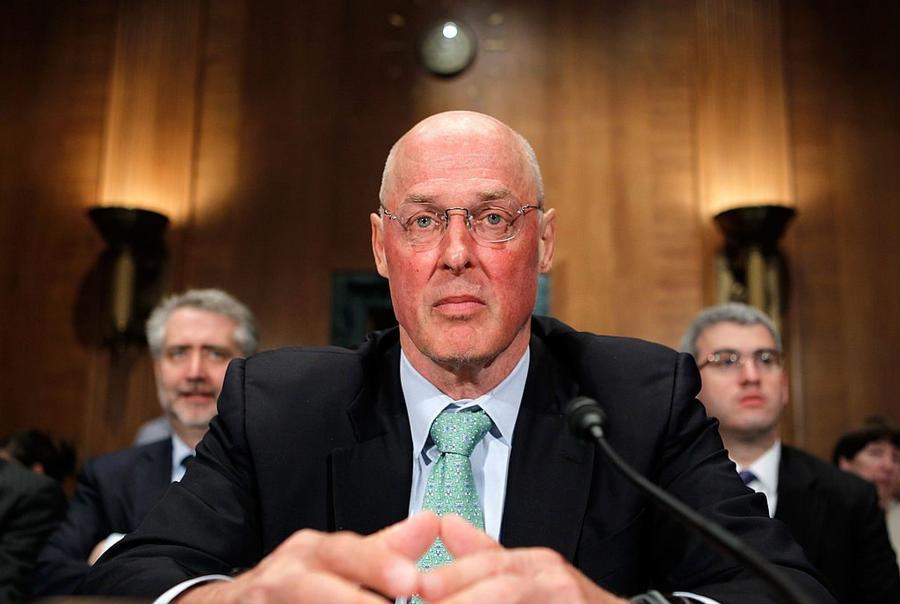On May 30th, 2006, George W. Bush nominated Henry Paulson to succeed John Snow as the 74th Secretary of the Treasury for the United States. The nomination alone was quite an honor for Paulson, but there were two catches: First, Paulson had to step down from his position as CEO of Goldman Sachs and be confirmed by the United States Senate. Next, assuming he was confirmed, Paulson would be required by law to liquidate his entire portfolio of stocks prior to officially taking office. For the average person, this second catch probably wouldn't be a huge deal. For Henry Paulson, however, that meant he would be forced to sell off his entire 1% stake in Goldman Sachs in the middle of one of the hottest stock market rallies in recent history. He also would have to be willing to take a pay cut from $40 million per year to around $183 thousand. Why on earth would he agree to do all this?
Before becoming Treasury Secretary, Henry Paulson spent 32 years climbing the ranks of Goldman Sachs. He joined the bank's Chicago office in 1974, where he analyzed large mid-western companies. He made partner eight years later, at the age of 36. Between 1983 and 1988, he steadily rose to the point where he was managing director of the entire Chicago operation. Next, he made the jump to the company's world headquarters in New York City. Henry served as Chief Operating Officer for four years before being named Chairman and CEO.
While serving as CEO, Paulson's annual salary typically ranged from a low of $16 million to an all-time high of $40 million. He was also given extremely generous stock option grants every year. As Treasury Secretary, Henry would be entitled to an annual salary of $183,500, and obviously, the US government doesn't offer stock options. So, why on earth would someone be willing to take such a massive cut in salary and perks? Especially one that required you to liquidate your entire stock portfolio in the middle of one of the hottest market rallies of the last 20 years?

Henry Paulson's $200 Million Deal / Alex Wong/Getty Images
The US government requires a handful of its most senior leaders to liquidate all of their stock holdings prior to taking office in order to remove any potential conflicts of interest. We can't have the President the Treasury Secretary, or the Secretary of State help certain industries because he or she stands to make a huge personal gain from a policy decision. Anyone who falls into this category must liquidate their holdings and place them into a blind trust while they serve in office. To soften that blow, the US Government has created a very special tax loophole…
In 1989, the government created a one-time loophole for a handful of high-level positions that would help attract highly talented professionals away from the private sector. This loophole gives the candidate the ability to liquidate his or her entire portfolio without paying a dime in capital gains taxes.
For someone like Henry Paulson, whose entire $500 million portfolio would have otherwise been subject to full taxation, that represented a very attractive opportunity. This is the only reason someone would agree to forfeit a glamorous $40 million-a-year job in order to make $183,000. Past public servants who took the government up on this loophole include Donald Rumsfeld and Colin Powell. The loophole only applies to people in the Executive Branch. That means the President, Vice President, and cabinet Secretaries. Senators and members of Congress do not qualify. Candidates either need to apply to qualify with the I.R.S. after the fact, or Congress will require the liquidation in advance for certain people and positions. Clearly, Henry Paulson's ownership of 1% of the world's largest investment bank would represent a clear conflict of interest as Secretary of the Treasury, so qualification was a no-brainer.
In July 2006, Henry Paulson liquidated 3.23 million shares of Goldman, roughly 1% of the entire company, in a one-time public sale. Goldman's $152 share price left Paulson with a tax-free gain of $491 million. Let that sink in. $491 million free and clear. Without this loophole, had Henry sold his shares at the same price and time, he would have been liable for more than $200 million worth of state and Federal capital gains taxes.
This obviously sounds amazing in hindsight, but there was definitely a time when Paulson deeply regretted selling his shares and becoming Treasury Secretary. In the year and a half directly after becoming Treasury Secretary, the stock market (and Goldman Sachs in particular) went on a massive tear. Between his first day in office, July 10, 2006, and October 26, 2007, the share price of Goldman rose from $152 to $236. Had Henry stayed CEO, not only would he have continued to earn $40+ million per year in salary, but his 1% stake in the company would have become worth $755 million!
Within a year, the entire financial industry had collapsed, and the world economy entered the biggest downturn since the Great Depression. After peaking in October 2007 at $236, thirteen months later, after the collapse of Lehman Brothers and Bear Stearns, Goldman shares slid 77.5% to an all-time low of $53.31. Had Henry stayed CEO through that entire roller coaster ride, his 1% stake would be worth just $170 million, roughly $100 million after taxes.
On the other hand. Hindsight is 20/20. As I type this article, Goldman is trading at an all-time high of $602 a share. Had Henry held on to his 3.23 million shares today, that stake would be worth $1.944 billion. If Henry sold everything today and paid 50% in taxes, he'd have $970 million. He would also be earning around $10 million per quarter thanks to Goldman's dividend.
/2010/11/Henry-Paulson.jpg)
/2023/08/jamie-dimon.jpg)
/2014/07/thumb-1.jpg)
/2011/03/Donald-Rumsfeld.jpg)
/2010/08/GettyImages-456848248.jpg)
/2009/11/Lloyd-Blankfein.jpg)
/2011/11/Nile-Rodgers-1.jpg)
/2013/11/GettyImages-872054696.jpg)
/2021/11/Mick-Hucknall.jpg)
:strip_exif()/2020/06/taylor.png)
/2009/11/Rod-Stewart.jpg)
/2020/01/Bruce-Buffer.jpg)
/2019/03/lh.jpg)
/2009/11/rw.jpg)
/2023/04/Robert-Smith.jpg)
/2013/02/GettyImages-71375168.jpg)
/2024/05/Ilia-Topuria.jpg)
/2011/01/Mira-Sorvino.jpg)
/2011/01/GettyImages-486584191.jpg)
/2021/01/Daryl-Hannah.jpg)
/2013/11/Gary-Lightbody.jpg)
/2020/02/buffer.png)
/2015/05/jh.jpg)